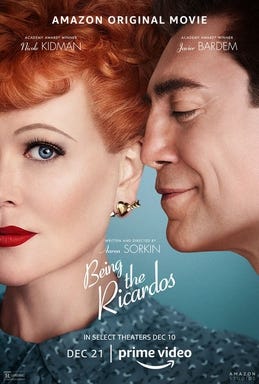Being the Ricardos: Like Lipstick for Chocolate
Aaron Sorkin’s Being the Ricardos focuses on the craziest week of making I Love Lucy. The audience watches Lucy and Desi in color deal with black and white issues on and off set for their black and white show. What do chocolate and lipstick have to do with McCarthyism and the Bible’s use of color? Looks like I’ve got some ’splaining to do.
**BE WARNED – MAJOR SPOILERS ENSUE**
I Love Laundry
As soon as I heard Aaron Sorkin was writing and directing Being the Ricardos, I had to see it. I grew up watching I Love Lucy reruns, so a biopic would be nostalgic. But I also really, really like Aaron Sorkin. Like I’d hop on any social network and tell the American president how I have the antithesis of malice for Sorkin. His scripts have fast-paced dialogue, wit and humor, and the ability to make any subject matter fascinating.
In his typical condensed-expansive style, Sorkin dives into one week to reveal many interconnected threads. The major plot centers around the false accusation of Lucy being a communist. Sorkin takes some liberties piling on many other intense events and one of the most important is Lucy questioning Desi’s faithfulness. As the third act opens the audience finally feels confident (along with Lucy) that Desi is not cheating, until it’s proven true in characteristic Sorkin fashion: We don’t even realize it when we see it.
Lucy can’t sleep and starts doing laundry. Desi stumbles into the laundry room and reminds her they have a housekeeper to clean the clothes. Lucy responds, “I like doing laundry, I never get the chance.” Ricky goes back to bed and Lucy returns to the clothes, suddenly stopping, holding up Desi’s handkerchief. She stares off in stunned silence. That’s it. That’s the film’s most pivotal point. You missed it too, huh?
Let’s hit rewind. Near the film’s start Lucy and Desi have just finished meeting with studio brass about the communist accusation and Lucy kisses Desi. She then takes out his handkerchief and wipes her lipstick off. Surprised, Desi says Lucy has never done that before, smiling, Lucy responds, “I know, I’ve seen other people do it in movies I’ve been in.”
Now fast-forward to the laundry scene. When Lucy holds a different handkerchief she realizes the lipstick’s crimson color is not hers. Betrayal. Desi’s constant promises that he was not cheating were lies.
Colors of Truth
Alfred Hitchcock famously used chocolate syrup as blood in Psycho because when viewing in black and white, color didn’t matter. But with anti-monopolistic intervention and the advent of RGB emulsions, color film became desirable and accessible. And the era of technicolor was ushered in. Many of us look back on the ’50s and ’60s as simpler times where the issues were actually black and white.
And yet, Being the Ricardos, produced in color, depicts the era as complex. So maybe ethics aren’t “oldies,” dated beliefs of an archaic age. Maybe Desi cheating on Lucy was wrong and damaging. Maybe McCarthyism became a witch hunt which effected artists (like Hitchcock) and the American psyche. Are ethics out of fashion now? Does that change their legitimacy?
Interestingly, minutes after I re-watched Lucy’s laundry scene I opened my Bible to a random spot and read “[Jesus’] clothes became shining, exceedingly white, like snow, such as no launderer on earth can whiten them.” The Bible uses color to explain complex concepts. When we visualize my sin was as crimson, but it’s been washed white as snow, the imagery of the color informs us about the subject matter unlike anything else. Saying sin is a crimson stain unable to be removed by any natural means, then juxtaposing salvation’s spiritualnatural ability to remove sin’s stain as white as snow, is crucial to the legitimacy of ethics.
Lucy’s recognition of a white handkerchief stained by crimson lipstick has deep ethical symbolism of betrayal and misconduct. Betrayal embitters us and makes us angry. And rightfully so. Lucy stays with Desi because of the show’s success but the damage was done. The beauty of watching media like Being the Ricardos is that we can learn from others’ mistakes.
Acknowledging we’ve damaged ourselves and others isn’t just to make us wallow in our pain or feel bad. It is to understand we’re actually hurting Jesus since He created every person and told us to love everyone, even our enemies. Every time we break Jesus’ ethics we’re damaging our relationship with Him, therefore He is the only one who can and does offer forgiveness if we ask for it. This forgiveness isn’t natural but it does demand that we then pour that mercy onto others.
And it’s the first step in forgiving ourselves and creating opportunities to receive forgiveness from others. That absolution doesn’t mean we stay with a cheating partner (and certainly not for the reason Lucy did), but it means that we’re led by God to forgive. Sometimes the forgiveness is releasing the damage and baggage marring our soul.
Conclusive Lipstick Cameras
The world is full of many shades of color, sometimes joy but often pain. The reality is that people lust and have affairs every day. But equally real is that every day is also an opportunity for redemption. Being the Ricardos provides insight on difficult situations and black and white ethics. Looking through the twin lenses of beautiful black and white ethics and reality’s captivating color, we can see positive prospects for navigating the greys and sepias of life.


